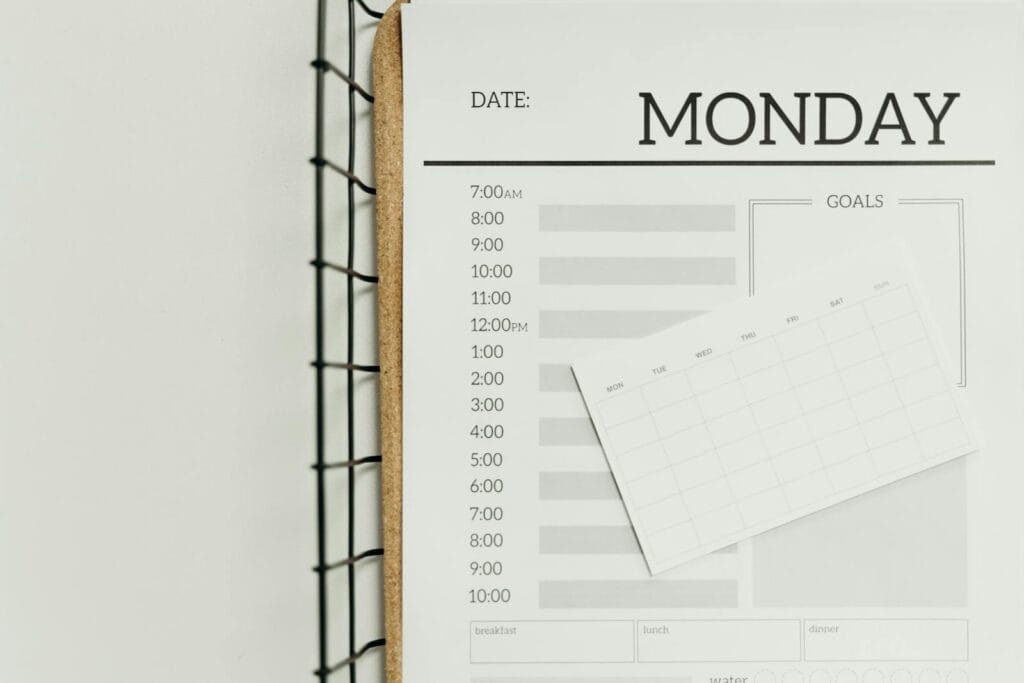Mondays have a way of sneaking up on us, don’t they? After a couple of days off, that first morning back can feel like a cold splash of water. The “Monday blues” are real—most of us know that stressful, slightly frantic feeling that seems to come with the territory.
A little planning on Sunday night can really change the game. Just 10-15 minutes to get yourself organized before the weekend wraps up can make things feel way more manageable. Try picking out your outfit, packing lunch, and glancing over your schedule. Fewer decisions in the morning means less stress.
Having something to look forward to on Monday can also shift your mindset. Maybe set up lunch with a friend or plan something fun for the evening, like catching a movie or hitting a fitness class. These little tweaks can help you start your week with a sense of purpose, not panic.
Key Takeaways
- Getting ready on Sunday—like picking clothes and prepping lunch—can make Monday mornings less hectic.
- Planning something enjoyable for Monday helps ease that typical start-of-week dread.
- Consistent routines make it easier to shift from weekend mode to work mode.
Preparing for a Smooth Monday
If you want Mondays to feel less like a tornado, it really starts with being intentional. Setting up a few simple systems ahead of time can make a world of difference.
Weekend Planning Habits
Taking a bit of time over the weekend to prep for the week ahead is underrated. Try mapping out your Monday tasks on Friday before you clock out. It lets your brain actually enjoy the weekend.
On Saturday or Sunday, skim your calendar for the week. Spot any meetings or deadlines that might need extra attention.
Meal prep helps, too. Planning and prepping some food in advance means you won’t be scrambling in the morning.
Lay out your Monday clothes the night before. It’s a tiny thing, but it saves you a headache when you’re still half-asleep.
Remember to relax a bit over the weekend. Finding that balance between getting stuff done and actually resting can help you show up on Monday feeling recharged.
Organizing Your Workload
Big projects can feel overwhelming, especially on Monday. Breaking things down into smaller, manageable pieces helps you rack up some quick wins.
A few ways to organize your workload:
- Priority matrix: Figure out what’s urgent and what’s important
- Time blocking: Set aside chunks of time for deep work
- Task batching: Group similar tasks together
- 2-minute rule: If something takes less than 2 minutes, just do it
Tidy up your workspace before you leave on Friday. Walking into a clean desk on Monday is surprisingly motivating.
Don’t overload your schedule. Mondays have a way of throwing curveballs, so leave yourself some breathing room.
Establishing a Sunday Evening Routine
Think of Sunday evening as your soft landing into the workweek. Double-check your calendar and to-do list for Monday, and make any tweaks you need.
Pack your lunch, set up your coffee, and gather anything you’ll need to take with you. This cuts down on morning chaos and helps you avoid forgetting things.
Some Sunday night habits worth trying:
- Quick tidy-up around the house
- 15 minutes planning your week
- Prep your morning essentials
- Stick to a regular bedtime
Maybe add something special to your Monday morning, like your favorite breakfast or a fancy coffee. It’s a small reward to look forward to.
Give yourself time to wind down on Sunday. Don’t work right up until bed—let your brain have a chance to reset.
Building a Productive Monday Morning
How you start your Monday really does set the tone for the whole week. With a little intention and a few good habits, you can make that first day feel more productive and a lot less stressful.
Morning Routines That Reduce Stress
Try waking up 15-30 minutes earlier than usual on Monday. That extra time means you’re not immediately rushing. Do something you enjoy with that time—maybe a good breakfast or a short walk.
It helps to prep your workspace on Friday before you leave. Spend 10-15 minutes getting organized so you don’t walk into a mess.
Some ideas to make your morning less stressful:
- 5 minutes of stretching or gentle yoga
- Jot down three things you’re looking forward to this week
- Set a positive intention for the day
- Skip email and social media for the first half hour
A regular routine tells your brain it’s time to focus, and that makes it easier to get into work mode.
The Importance of Sleep and Energy
Honestly, Monday starts Sunday night. Try to get 7-8 hours of good sleep so you’re not dragging.
Keep your sleep schedule steady from Sunday to Monday. Even shifting by an hour can throw you off and make getting up harder.
A few sleep tips:
- Cut screen time an hour before bed
- Keep your room cool (65-68°F is ideal)
- Avoid heavy food and alcohol late at night
- Try a short wind-down routine like reading or stretching
Still tired on Monday? A quick 10-15 minute walk, especially outside, can wake you up better than another cup of coffee. Sunlight helps reset your body clock and perks you up.
Healthy Breakfast Choices
Skipping breakfast on Monday is a recipe for brain fog. Your body needs some fuel to get going.
Go for breakfasts with protein and lasting energy. Here are a few options:
| Breakfast Option | Benefits |
|---|---|
| Greek yogurt with berries and nuts | Protein, antioxidants, healthy fats |
| Oatmeal with nut butter | Sustained energy, fiber |
| Eggs with whole grain toast | Complete protein, B vitamins |
| Smoothie with protein powder | Quick option, customizable |
Prepping some of this on Sunday can make Monday mornings smoother. Even 10 minutes of prep can save you from scrambling.
Don’t forget to hydrate. Try to drink at least 16oz of water within your first hour up.
Prioritizing Your First Tasks
Write your Monday to-do list on Friday before you leave work. That way, you’re not staring at your desk Monday morning, wondering where to start.
Use the “1-3-5 Rule”: 1 big task, 3 medium ones, and 5 small ones. It’s a good way to keep things realistic.
Start with a quick win—a task you can finish in the first 30 minutes. It helps build momentum.
Block off your peak focus time for your most important work. For most people, that’s the first couple of hours in the morning.
If you need motivation, plan a reward for Monday evening. Having something to look forward to can make the day easier to handle.
Maintaining Balance and Motivation Throughout the Day
Staying energized and focused on Mondays is all about mixing structure with a bit of flexibility. Finding your sweet spot helps you get stuff done without burning out.
Taking Breaks and Managing Distractions
Plan your breaks ahead of time. The Pomodoro technique is solid—work for 25 minutes, then take a 5-minute break. It keeps your mind fresh.
Silence notifications during work blocks. Stick your phone in another room or use a website blocker if you need to.
Set up a workspace that tells your brain it’s time to focus. If you’re working from home, this can make a big difference.
Fit in short walks between tasks. A little movement helps clear your head and reduces Monday anxiety.
If noise is an issue, try noise-canceling headphones or play music without lyrics.
Incorporating Fun and Creativity
Find ways to make Monday a bit more enjoyable. Grab lunch with a friend or a coworker to break up the day.
Make boring tasks a little more fun—set a timer and see if you can beat your best time.
Quick mood boosters:
- Play upbeat music while you work
- Keep a funny calendar or quote nearby
- Wear something you love
- Bring a treat just for Mondays
Switch up your tasks. If you’re stuck on something analytical, do something creative for a bit.
Using Reward Systems and Positive Reinforcement
Set up a reward system for yourself. Knock out three important tasks? Treat yourself to your favorite coffee or a longer break.
Track your wins somewhere visible—a checklist or progress bar can be surprisingly motivating.
Try micro-rewards throughout the day:
- Finish morning emails → 5-minute social break
- Complete a big project step → step outside for fresh air
- Tidy up at the end of the day → enjoy a podcast on your commute
Give yourself credit for small wins. Mondays are tough—every bit of progress counts.
Plan something fun for Monday evening as a final reward. Whether it’s a favorite meal, TV show, or hobby, having something to look forward to makes the day less of a slog.
Cultivating Healthy Habits and Mindsets
Building good habits and a positive mindset can really take the edge off Mondays. Even small tweaks in your routine or attitude make a big impact.
Practicing Gratitude and Reflection
Starting Monday with a little gratitude can flip your perspective. Spend five minutes jotting down three things you’re thankful for. It helps your brain focus on the good stuff, not just the stress.
Try reflection prompts like:
- What went well last week?
- What are you looking forward to this week?
- Who made a positive difference for you lately?
Gratitude practices boost your mood, and you don’t need anything fancy—a note on your phone is fine.
Maybe set your alarm 10 minutes earlier on Mondays to fit this in without feeling rushed.
Establishing Healthy Routines
Routines bring stability, especially on Mondays. Spend 10-15 minutes on Sunday organizing your workspace and looking over your schedule.
Try these habits:
- Lay out clothes the night before
- Prep breakfast and lunch ahead of time
- Check your calendar before bed Sunday
- Stick to a regular wake-up time
Make your Monday morning feel good—maybe it’s a special coffee, a podcast, or just a few extra minutes in the shower.
If you can, avoid heavy meetings or tough tasks first thing Monday.
Exercise for Mood and Stress Relief
Moving your body is one of the best ways to shake off Monday stress. Even just 10 minutes can help.
Morning exercise ideas:
- Quick: 10-minute yoga or a brisk walk
- Medium: 20-minute home workout or bike ride
- Longer: Gym session or a run
If mornings are rushed, fit in movement breaks throughout your Monday. Set a timer to stretch every hour or so.
Exercise releases endorphins that make you feel better. Find activities you actually enjoy, and you’re more likely to stick with them.
Coping With Procrastination and Monday Blues
It’s easy to procrastinate on Mondays, especially when everything feels like a mountain. Breaking big things into small steps helps you get started.
A few tricks:
- The “two-minute rule”—if it takes less than two minutes, just do it
- Start with one small, doable task to build confidence
- Try the Pomodoro Technique: 25 minutes work, 5 minutes break
Setting clear intentions for your week helps you focus. Instead of seeing Monday as a never-ending grind, try to view it as a fresh start.
And don’t forget to plan something nice for Monday evening. It gives you a little light at the end of the tunnel.
Frequently Asked Questions
A lot of people struggle with Monday stress. Here are some practical ways to make the start of your week feel a bit more manageable.
What strategies can help in overcoming the Monday blues?
Try planning something you’ll actually look forward to on Mondays. Maybe schedule lunch with a friend, or pick a fun activity for after work—something that gives you a reason to smile when the alarm goes off. (Here’s an idea if you’re stuck.)
Waking up just 15 minutes earlier can make a surprising difference. It’s not much, but having that extra bit of time means you’re not immediately in a rush. Honestly, starting the day a little slower can help keep the panic at bay.
If you’ve got a few minutes, try a short meditation or some deep breathing. Even five minutes of mindfulness can help shift your mood and make facing the week ahead feel a bit less daunting.
What are effective ways to start the week off on a positive note?
Think about creating a Monday ritual you actually enjoy. Maybe it’s your favorite breakfast, a podcast you save just for Mondays, or taking a slightly longer route to work if it means passing by something nice.
Wearing clothes that make you feel good can really set the tone, too. It’s strange how much your outfit can impact your confidence and even how people react to you.
Start with a small, doable task first thing. Knocking something off your list early gives you a little boost and can make the rest of the day feel more manageable.
How can one transition smoothly from the weekend to a productive Monday?
Try not to stay up too late on Sunday. Being well-rested makes getting up on Monday way less painful, and you’ll probably find it easier to focus.
Take a quick look at your calendar and to-do list on Sunday evening. Ten minutes is enough—just to avoid any nasty surprises when Monday hits.
Make your Sunday evening a little more enjoyable, even as you’re prepping for the week. It helps ease the shift from weekend mode to work mode.
What are some tips for organizing your work to alleviate the stress of Mondays?
Time blocking can really help. Set aside certain hours for emails, meetings, and actual focused work so you don’t feel pulled in a million directions.
Write your Monday to-do list on Friday before you leave work. That way, you’re not thinking about it all weekend, and you’ll have a clearer start.
If you can, keep Monday mornings light on meetings. It gives you a chance to settle in and get your bearings before diving into group stuff.
How does preparing for Monday on the previous Friday impact the start of the week?
Spend 10-15 minutes tidying up your workspace on Friday. Coming in to a clean desk (or at least not a disaster) makes Monday less intimidating.
Setting your Monday priorities on Friday afternoon means you can start working right away, instead of wasting time figuring out what’s most important.
Try to finish off any small, lingering tasks before you head out for the weekend. It keeps them from piling up and making Monday feel overwhelming.
What habits can be adopted to consistently make Mondays feel more enjoyable?
Try shifting how you think about Mondays. Rather than seeing them as something to dread, maybe treat them as a chance to reset and kick off the week on your own terms. It’s not easy, but a little mindset tweak can go a long way.
Set up a little Monday reward for yourself. That could mean grabbing your favorite coffee or sneaking out for a short walk in the afternoon—just something small to look forward to.
Establish Monday-specific routines that help you ease into the week. When you have a few familiar habits, Mondays can start to feel a bit less overwhelming and maybe even a touch more comfortable.




